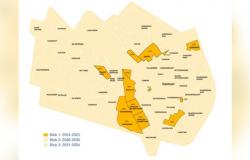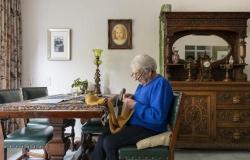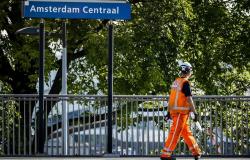For an afternoon, attention was paid to the mental suffering among young people in the earthquake area. The IMG presented the research on Thursday during a symposium in Forum Groningen and hopes for a plan. “So incredibly theoretical, it makes me sick.”
There may be many policymakers, civil servants and councilors in the room during the symposium in Forum Groningen, but the group at stake receives plenty of attention. “How do you experience this yourself?”, presenter Renée van der Sluis asks 21-year-old Kiet Winter from youth organization JongerenTop.
He doesn’t have to think long about a response. “There is a lot of mistrust,” says Winter about the sentiment among his contemporaries in the earthquake area. “You lose trust when promises are not kept time and time again. That feeling prevails with me and with my friends.”
‘The supply is too fragmented’
More than two hours were set aside on Thursday to discuss what can be done for Groningen children and young people with emotional distress. Board member Els van Schie of the Groningen Mining Damage Institute (IMG) had the Hanze investigate what is required for this and held a symposium with about two hundred attendees about the research report in the Forum’s Rabo Studio.
“Many young people cannot find their way to care because it is not properly arranged. The supply is too fragmented,” says researcher Ria Reis firmly during the first part of the program. The researcher lists a list of recommendations and states that it is necessary to choose a joint approach. There are many nodding faces in the room at the recommendations. “Nice story,” someone says softly.
‘Groningen at the top of lists where you don’t want to be at the top’
Fellow researcher Susan Ketner also makes no bones about it. “Groningen is at the top of all kinds of lists where you don’t want to be at the top.” For example, poverty in Groningen is higher than anywhere else in the Netherlands, but mental health is also dramatic. Not least among young people in the earthquake area, a group that, according to the IMG, requires immediate attention.
In any case, attention will certainly be paid to the suffering of young people on Thursday. Everyone agrees: they need to be helped as quickly as possible. But opinions seem to differ on how this should be achieved. Gas representative Top has her own view on the research, as becomes clear when she takes a seat on stage for her panel discussion with GGD boss Jaap Koopman and Esther Pijs from the Ministry of Economic Affairs.
‘Ring the doorbell: how is your family?’
Top calls it unfortunate that solutions for mental problems among young people are fragmented and sees this as a broader problem. According to her, lack of clarity is the cause of much misery in the earthquake area. People don’t know where they stand, you have to solve that, says Top. “There is symptomatic treatment. You have to tackle the cause, otherwise you are mopping with the tap open. A clear approach is also needed at the front.”
The key question is which string to pull. According to Top, this is a complex problem and cooperation can also be a pitfall. If you want to work efficiently, you cannot involve everyone in every step, she believes. She would prefer to work proactively and from the bottom up. “Knocking on people’s doors and asking: how is your reinforcement going? But also: how is your family?”
‘There have been so many ideas and plans’
Nicole van Eijkern ‘firmly’ believes in this door-to-door approach to discovering mental problems within families. The victim is annoyed by the enormous amount of information that people like her receive through websites and letters. “It’s so incredibly theoretical, it just makes me sick. I’m not stupid, but sometimes you just don’t understand what’s on the IMG site.”
According to her, that is where the solution lies: ensuring that residents, and therefore also young people, understand where they stand. “Talk big by starting small, in people’s homes. Explain it well.” Van Eijkern does not see much in a systematic approach to solving emotional suffering. “There have already been so many ideas and plans. Make accessible what is already there. It can be that simple.”
‘Would absolutely work for the entire area’
As a care provider at Safety Net Special Situations, Diana Feringa encounters many families and children who are doing very poorly. The committee currently helps about 60 families. Feringa praises the complete approach used. “People really need an integrated approach, so one solution for their entire family. I think it would absolutely work if you made that possible for the entire area.”
Then presenter Van der Sluis walks with the microphone to Henk Nijboer, at the front of the stands. He feels called to stand for a moment and introduce himself to the audience. After all, as quartermaster, the former MP must determine how the most pressing problems in Groningen should be solved. A great responsibility rests on his shoulders.
‘Promise that this will be one of the most important’
Young people with mental problems are certainly on the radar, Nijboer assures. “It is very disappointing to me how poorly things are going for the youth. A dull misery, something has to be done about it. I can promise that helping youth will be one of the most important proposals I will recommend.”
Top agrees that she will discuss the research report with Henk Jan Bolding as soon as possible. Both sit on the Social and Health Administrative Table, a working group for social emotional support in the earthquake area. Bolding was unable to attend on Thursday.
Kiet Winter thinks that young people benefit from transparency in any case. “We want to know where we stand. And we can really think along with policy. We speak to other young people, can collect feedback there and represent their interests.” That seems to be going well. On Tuesday he will talk to Nijboer and national and regional administrators on behalf of Youth Top.






